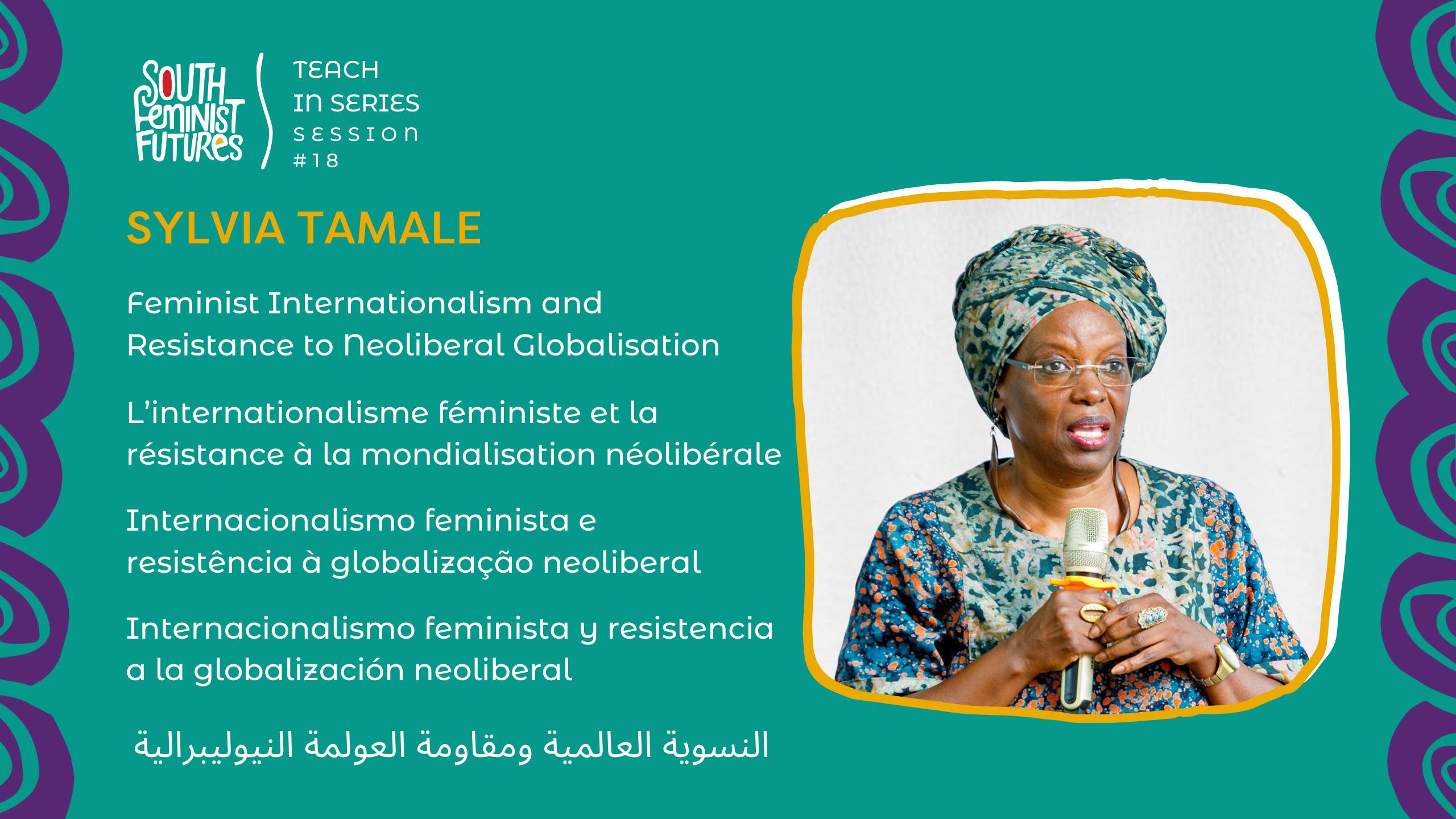Title: Feminist Internationalism and Resistance to Neoliberal Globalisation
Speaker: Sylvia Tamale
Link: https://vimeo.com/1032647418
Overview
Professor Sylvia Tamale provides an in-depth analysis of neoliberal globalisation, and argues that feminist internationalist organizing is essential in resisting the violence and harm that neoliberal capitalism and globalisation brings to global majority peoples and lands. She prefers to use the terms global minority and global majority, rather than global North and global South, respectively. This is because the terms “North” and “South” reduce economic disparity to geography, where “North” may refer to the perpetrators of exploitative neoliberalism and “South” to those affected by it. However, in analysing the complexities of neoliberal globalisation and its effects, we see that poverty, exploitation, and struggle exist in the global north, just as an economic and political bourgeois elite that benefits from neoliberalism exists in the global south.
Land grabbing: An introductory example of neoliberal globalisation
Prof. Sylvia begins her lecture by sharing an example from Uganda, when in 2015 the local Minister of Lands and Internal Affairs planned to demarcate Nile districts, stealing land from the Arua community. The local population rose up against this, and in one act of defiance, a group of elderly women stripped naked, wailed, and protested. In a video shared by Tamale, we see how women exercised their collective power as a form of resistance against land grab. She explains that women exposing their bodies (as mothers, givers of life) in this way is a symbolic act, traditionally considered a curse that brings social death upon those who violate their freedoms – and indeed, following their protest, the ministerial decision to acquire the Arua land was reversed.
Rooted in colonialism, land grabbing as a form of economic exploitation remains a common practice in the current “post-colonial” era of neoliberal globalisation. As we see in this example, local governments are often complicit in destroying the ecosystems of their own populations to the material benefit of the global minority. In contrast, however, we also see how the modern, neo-colonial system at play is successfully derailed by a local act of defiance that draws on the power and knowledge of women and their traditional (i.e, non-colonised) understandings of gender, body, and protest.
Neoliberal globalisation
“Neoliberal globalisation is the vehicle through which liberal capitalism and western imperialism spread their tentacles to resource rich regions around the world for profit.”
Market expansion: Neoliberalism is a profit-centred system perpetuated by multinational actors, comprising of financial institutions, corporations, and states. It came of age in the late 1980s/early 1990s, and its political economy is built on free markets, free trade, private property rights, minimal involvement of government, deregulation of the financial industry, and low taxation for the rich. It thrives on extracting land, resources, and labour from the global majority, and exploits these to amass wealth for the global minority. The notion that global majority countries are “underdeveloped” is core to the neoliberal system, as the economic interventions of the global minority and its institutions are often disguised as development projects that claim to lift local populations out of poverty. Prof. Sylvia also highlights how the individualistic, profit-centred ambitions of neoliberal globalisation have “eroded the ethics of communitarianism, solidarity, and interconnectedness embedded in the philosophical traditions of people from the global majority”.
Tamale explains that globalisation in itself is neither new nor inherently bad – but in this current age, our global relations are used to expand markets, which exacerbates existing social inequalities. The global majority has been forcibly incorporated into the neoliberal capitalist system and the global flow of finances, goods, and socio-cultural dynamics. Prof. Sylvia shows throughout her talk that under neoliberal globalisation, financial institutions such as the World Bank, the International Monetary Fund, and the World Trade Organisation largely control the global economy, and that debt is a major resource for finance capital and the governance of capitalist relations. These institutions have the power to invest, lend, write off debts, and implement “Structural Adjustment Programs” for “poverty recovery”. Economic concepts promoted by these institutions, such as retrenchment, cutbacks, privatisation, user fees, and deregulation, have led to high unemployment rates, the decline of local economies, and higher costs of living. This has paved the way for multinational entities to take over. As Prof. Sylvia puts it, “Austerity for the global majority guaranteed prosperity for the global minority.”
Intersectional violence & the impact on women: Prof. Sylvia highlights that this is a marked continuation of century-old imperialist ambitions, with the principle of wealth accumulation at the core. Neoliberal globalisation is driven by ideologies that justify oppression, and it institutionalises this through racialised domination – slavery, genocide, plunder, repression – as well as heteropatriarchal capitalism, where women and gender-diverse people’s productive and reproductive labour is exploited. These systems of domination form a structure of intersectional violence based on racism, sexism, and classism, and cause serious economic and environmental crises in the countries of the global majority. As such, Tamale asserts that the wealth hoarded by the global minority is built on the backs of non-white populations and women and gender diverse people. Women as primary life-givers and caretakers bear the brunt of this violence.
Tamale further emphasises the gendered relations at the core of this system by giving the example of migrant domestic work. While racist visa policies heavily restrict movement, feminised labour migration from the global South to the global North and the Middle East is on the rise. These movements are state-assisted due to the remittances they bring into their countries, but migrant women work within a system that is highly reminiscent of slavery.
Feminist internationalist resistance
Prof. Sylvia explains that feminist internationalist resistance is rooted in the agency and solidarity of women and gender-diverse people in the global majority, as they seek to restore dignity and eliminate the oppression exerted by the global minority through its neoliberal project. Internationalism refuses the confines of borders, race, class, religion, nationality, caste, heteronormativity, and other identity constructs, and is an effort to form a movement of “globalisation from below”, focusing on intersectional gender justice in an effort to dismantle global neoliberal structures. As an internationalist effort, feminist resistance should not essentialise or homogenise oppression, but rather recognise the diverse, compounded experiences that can be encountered simultaneously. This recognition can give rise to innovative forms of resistance.
Decolonisation and conceptual clarity: Neoliberal globalisation, like colonialism and imperialism, has become embedded and normalised in the everyday structures, institutions, and power relations that we navigate – formal education, media, religion, and so on. As such, part of our collective resistance must involve gaining conceptual clarity and educating ourselves to understand the systems at play, in order to unlearn these norms and decolonise our practices and minds – especially in the face of growing neoliberal fundamentalist movements. We can do this primarily through returning to traditional and alternative forms of knowledge, such as indigenous understandings and embodiments of gender, or Indigenous approaches to and interactions with natural resources and ecosystems.
Rejecting appropriation: Neoliberal institutions and policies have adopted feminist concepts such as gender, empowerment, and intersectionality in their human rights discourse. These terms are largely used for political correctness in the development of the private sector, and we need to reject this appropriation that exploits our movements. In parallel, we also need to reject NGO-isation: when women’s movements become absorbed into NGO structures, they become institutionalised and bureaucratised, and subject to international neoliberal politics and regulations – especially in donor relations. This legitimises the neoliberal system, which is highly undemocratic and incapable of delivering gender liberation and justice.
Playing into the cracks and contradictions of neoliberal globalisation:
The power of community: While neoliberalism is highly individualistic in principle, neoliberal globalisation and global capitalism rely heavily on the global connectedness of the economy, and on communal consumer behaviour. Therefore, actions such as unionisation and boycotts can have a powerful impact in dismantling neoliberal systems.
Global connectedness: While technology holds significant detrimental potentialities, it also provides opportunities for connecting and learning. For example, internet platforms allow for knowledge production and dissemination, transnational communication, and alternative forms of educational media.
Feminisation of resistance: Where there is a feminised exploitation, there is feminised resistance. Giving an example from the mass, collective mobilisation of Filipina migrant workers, Tamale shows that women have the power to rise up against the systems that exert gendered and racialised oppression and exploitation. She argues that the feminisation of resistance can promote a radical transformation of the socio-economic order, and that the power and solidarity generated through internationalist organising should work from the ground up.
To conclude, Professor Sylvia emphasizes the urgency and necessity of resistance in the face of such a violent and oppressive system: “When you are being squeezed on all fronts, you have no choice but to fight back. When the neoliberal foot is pressing on your neck, and you cannot breathe, you fight for your very life. When you have reached the end of the tether, and you have nothing to lose, you fight with your life.”
This summary was written by Talah Hassan.

Talah lives in Beirut and works in feminist knowledge production, from research, writing, and editing to conceptualizing and coordinating creative projects and workshops. She is trained in medical anthropology, with specific interests in sexuality and sexual health, politicized notions of care, embodiment, and the medical / mental health industrial complex. She is skilled in qualitative research methodologies, especially oral history and research ethics, and in qualitative data analysis. She co-founded and organizes with a local queer mutual aid group in Lebanon, alongside other feminist, leftist groups when possible.
